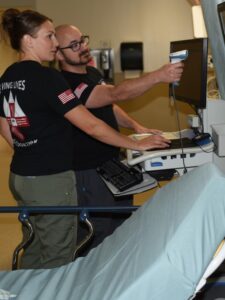
Story by Gino Mattorano
Evans Army Community Hospital
Many surgery patients at Evans Army Community Hospital now have the option to go home on the same day they have surgery, thanks to the collaborative efforts of the hospital’s Surgery Department, Family Care Ward and the hospital’s workflow committee.
While looking for ways to streamline processes and improve workflow, they discovered that many surgery patients, primarily those undergoing joint replacements, hysterectomies and certain Ear, Nose and Throat (ENT) procedures, were being admitted to the family care ward, only to be sent home several hours later, upon meeting discharge criteria.
Surgery patients normally go to the Post Anesthesia Care Unit, or PACU, after surgery, but the PACU doesn’t have the physical space to be able to “house” these patients for several hours until they meet the discharge criteria from the surgeon, according to Thomas Belanger, the Assistant Clinical Nurse Officer-In-Charge of Preadmissions Testing for the PACU.
As a result, these patients were being sent to the family care ward temporarily, which reduced the ward’s overall bed capacity. Belanger says they decided to bring the issue to the hospital’s workflow committee to determine how best to create a temporary space for the recovering surgery patients.
The committee determined that there was a vacant room available and set about obtaining approval and staffing to use the space for recovering surgery patients, in what is now called, Phase II Extended Observation.
The committee worked with the hospital leadership team, the facilities department, The Joint Commission, and infection control to obtain approvals for the new Phase II space, which can accommodate up to four patients at a time.
“To date, we have successfully discharged 62 patients since we opened Phase II in mid-November of 2023,” Belanger said. “This not only streamlines our process for recovering surgery patients, but it increases capacity in the family care ward.”
The surgery team also uses the Phase II space for quick surgeries like cataract surgery and other outpatient surgical procedures, according to Belanger.
“We often have six to eight of these surgeries in one day, so being able to utilize the Phase II space prevents backups in the PACU area, making for a smoother discharge process,” Belanger said.
Col. (Dr.) Eric Ahnfeldt, chief, EACH Department of Surgery, says this capability not only benefits the patients by allowing them to go home and sleep in their own beds the day of surgery, but it also protects patients from unnecessary hospital admissions.
“This is particularly true during flu season as we do our best to minimize exposure to hospital patients with the flu,” Ahnfeldt said. “This leads to better outcomes. It’s a win-win.”